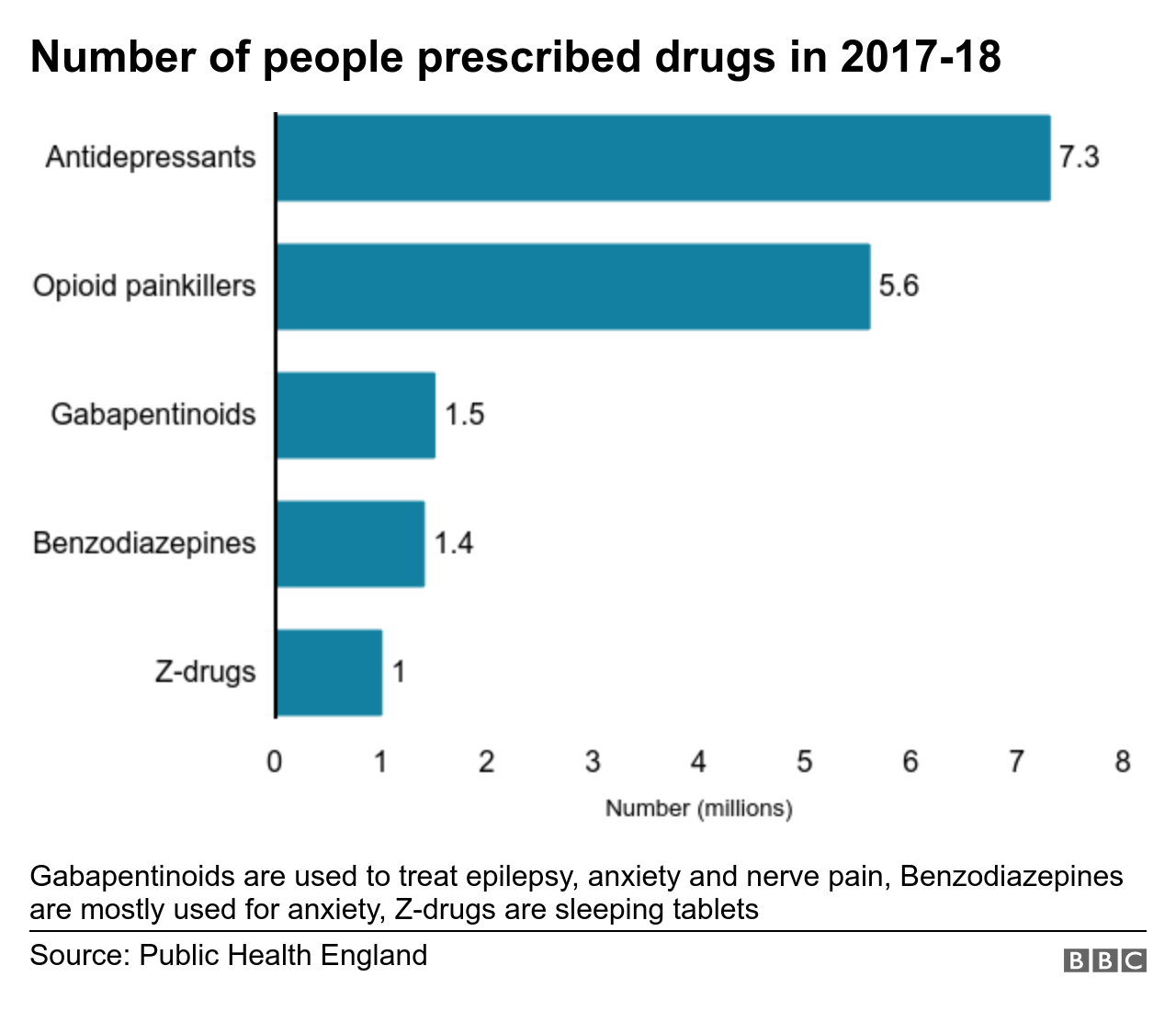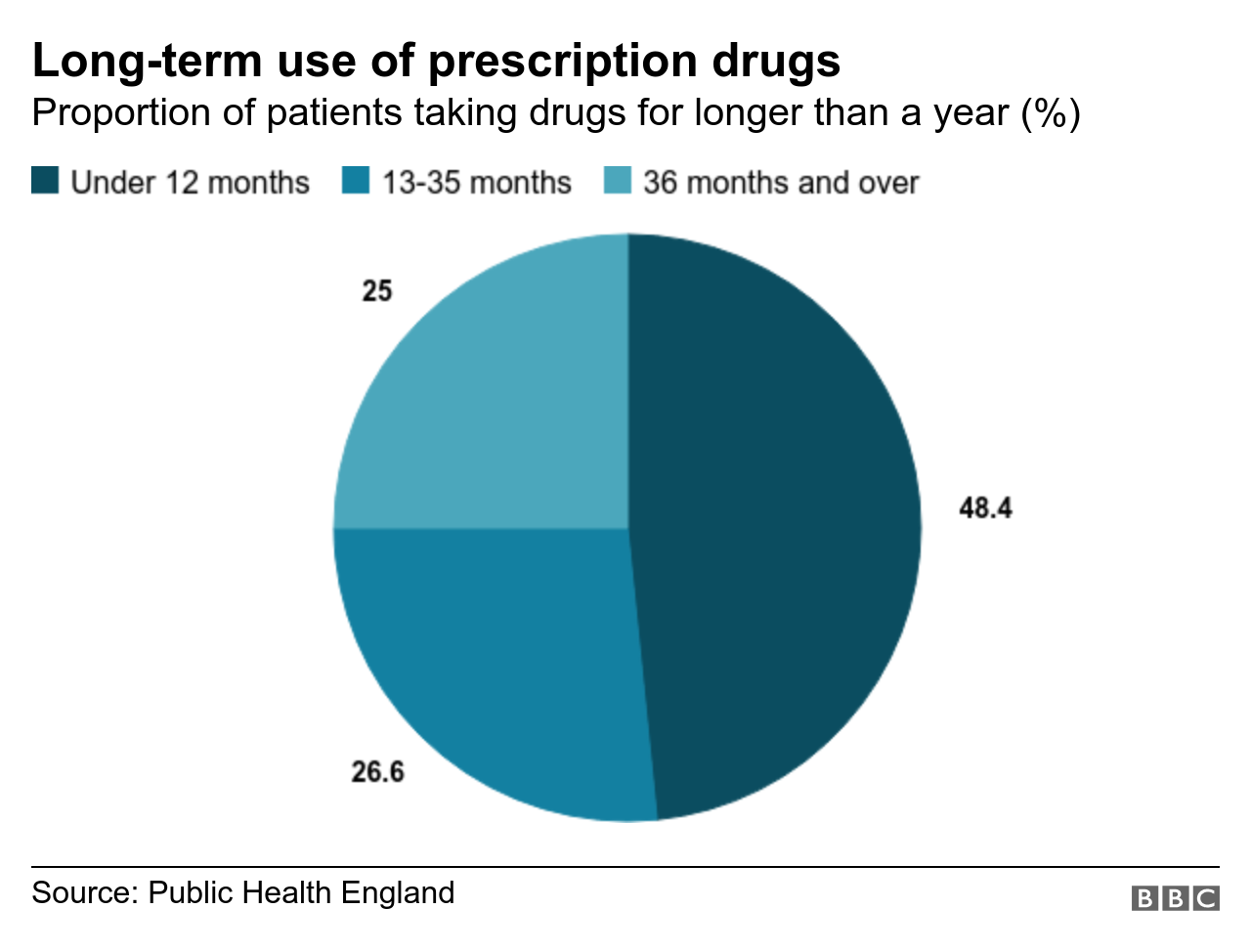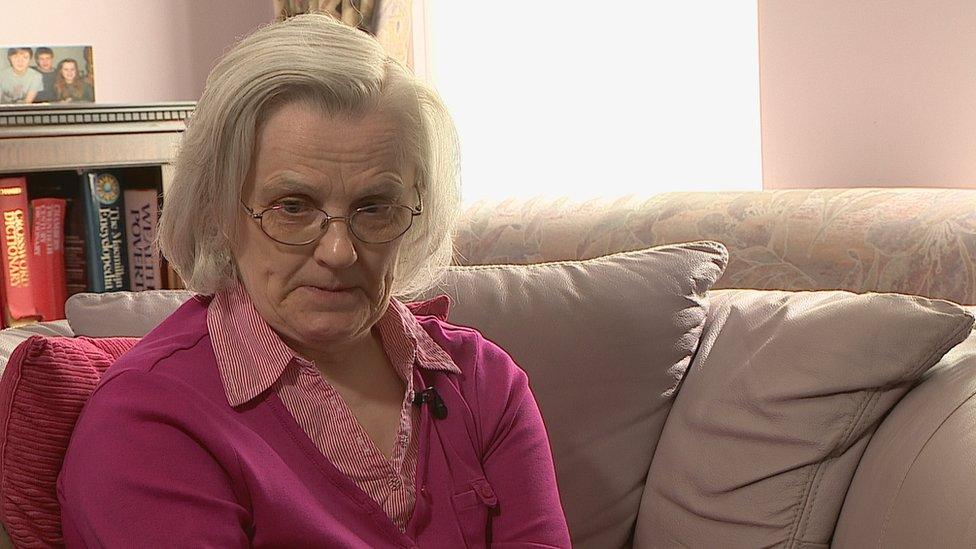Too many hooked on prescription drugs - health chiefs
- Published
- comments

Hundreds of thousands of people in England are getting hooked on prescription drugs, health chiefs fear.
A Public Health England review looked at the use of strong painkillers, antidepressants and sleeping tablets - used by a quarter of adults every year.
It found that at the end of March 2018 half of people using these drugs had been on them for at least 12 months.
Officials said long-term use on such a scale could not be justified and was a sign of patients becoming dependent.
PHE medical director Prof Paul Cosford said he was worried.
"These medicines have many vital clinical uses and can make a big difference to people's quality of life."
But he added there were too many cases where patients were using them for longer than "clinically" appropriate - where the drugs would have simply stopped working effectively or where the risks could outweigh the benefits.
"We need to make sure people are helped to access alternative treatments," he added.

Prof Helen Stokes-Lampard, of the Royal College of GPs, said doctors did not like prescribing medication long-term, but were sometimes left with no choice.
"What it indicates is the severe lack of alternatives."
NHS England said investment was being made in services such as talking therapies and so-called social prescribing, which includes exercise classes and arts-based activities, that could be more appropriate.
'I became a recluse'

Katie was addicted to painkillers for 10 years after having her appendix out in hospital and then being misdiagnosed - she was suffering from endometriosis that was not spotted.
At one point, she was taking 24 painkillers a day.
"I became a recluse. I put on weight.
"I chose taking painkillers over going out with my friends.
"It affected my relationships."
She said for years she did not get any help, until she was sent to the Bridge Project, a charity in Bradford that works with people with drugs problems.
With their support, including counselling, she managed to wean herself off painkillers and has not taken them since the end of last year.
"There are some hard days. But I have got my life back now."
What drugs were reviewed?
Five classes of medicines were included in the review - asked for by government amid concern that large numbers of people were misusing prescription drugs.
They were:
Antidepressants
Opioid painkillers for acute pain and injury (excluding use in cancer patients)
Gabapentinoids (used to treat epilepsy, anxiety and nerve-related pain)
Benzodiazepines (mostly prescribed for anxiety)
Z-drugs (sleeping tablets)
The number of prescriptions being issued has been rising for some time - partly because of the ageing population - although there are signs their use is slowing.
To assess the levels of dependency, PHE officials analysed patient data to find out exactly how many people were taking these drugs outside of hospitals and for how long.
Half of people who were using the drugs in March 2018 had been on them for a year or more with about a quarter having used them for at least three years.
Rates of prescribing were higher in deprived areas and among women.
Can long-term use be justified?

How long each drug should be used varies.
Opioid-based painkillers should only be used for short periods so the fact that there were 1.2 million people on them for at least a year - 540,000 of whom had been taking them for at least three years - was extremely worrying, PHE said.
Antidepressants by comparison take some time to become fully effective so it is not surprising to find people using them for a long time.
But there were nearly 1 million people using them who had been on them for at least three years, which rang alarm bells, PHE said.
Officials said the scale of that long-term use suggested those with mild-to-moderate depression may have become dependent on them.
For the other drugs, there was only a minority of cases where long-term use was appropriate, PHE said.
Prof John Read, of the British Psychological Society, said the findings were "alarming".
Health Secretary Matt Hancock said the report should act as a "wake-up call".
"I refuse to let this escalate to the level seen in the US."
What should patients do?

PHE said patients should not simply stop taking their drugs.
Instead, they are urging patients to speak to their GP, who are being told to do more to review the use of these medications and seek alternative solutions.
Doctors say any attempt to tackle dependency needs to involve a gradual reduction in use and dosage.
Alternatives such as talking therapies can be used instead of antidepressants, while linking people in with social activities, such as arts groups, can help reduce isolation and depression and tailored activity programmes and physio may be used to tackle pain.
PHE said it was not clear if this scale of long-term use of prescription drugs was causing harm - although each drug does have side-effects, including weight gain and placing stress on the heart, kidney and lungs.
But they said long-term use meant tolerance could build up and treatments could stop being effective or require patients to up the doses they were taking, while any reduction in use could lead to withdrawal symptoms.
Has the situation got as bad as the US?
The misuse of prescription drugs - and in particular opioid-based painkillers - is a major problem in the US.
Prescription rates have risen sharply since the late 1990s - and there are signs attempts to crack down on this have driven people into the illegal market for drugs.
Deaths from opioid overdoses have more than doubled in the past decade in the US.
PHE said what is being seen in England is not yet on that scale.
Prescription rates are four times lower in England than the US and deaths from overdoses have not increased at such a rate.
In fact, PHE said opioid prescriptions were also lower than in many other European nations.
"We want to get on top of this now before we see the problems that have been seen elsewhere," Prof Cosford added.
- Published25 October 2017

- Published29 June 2017
